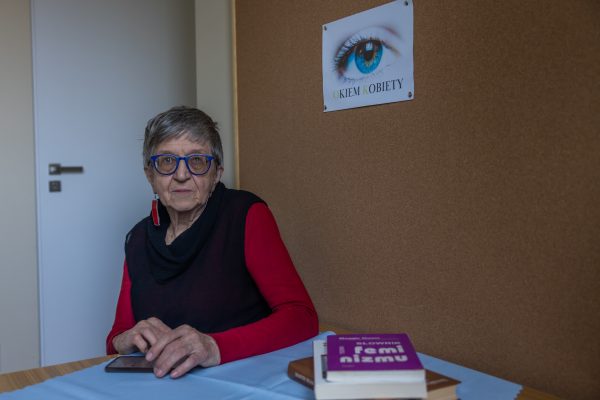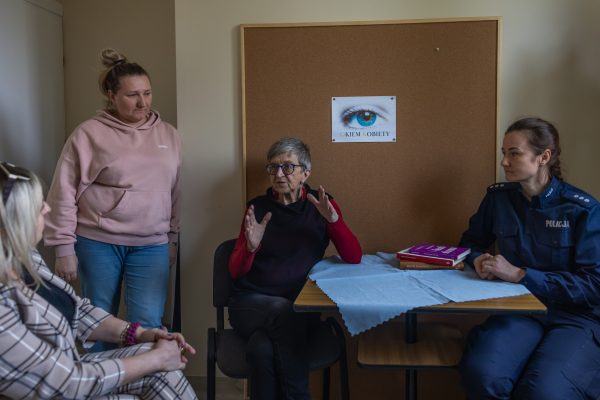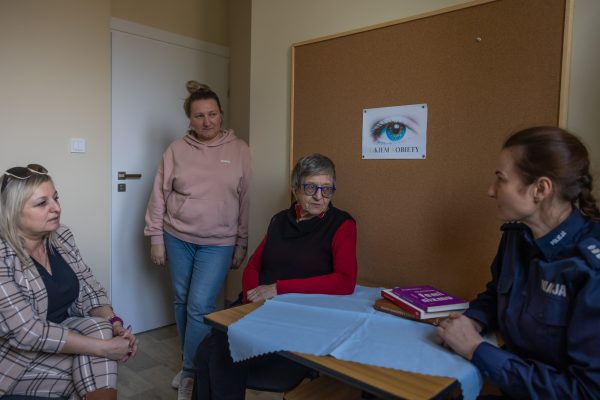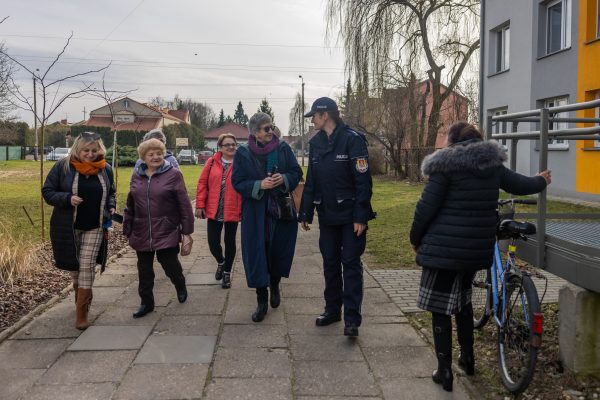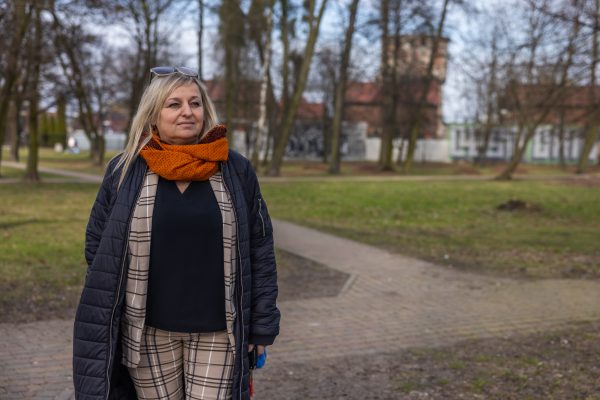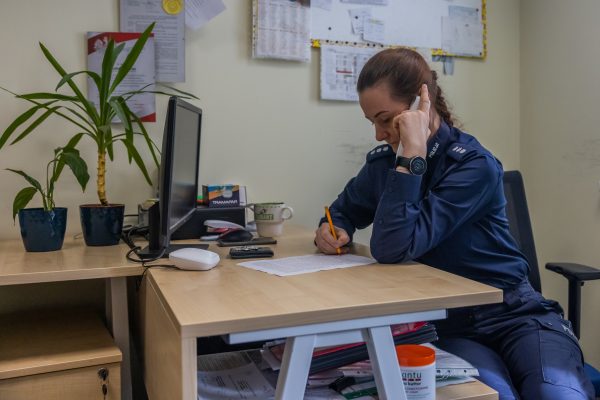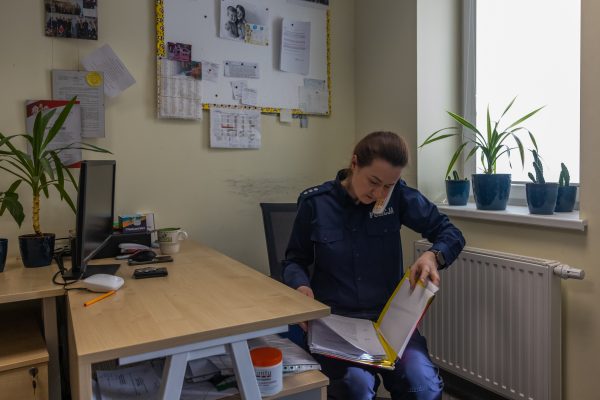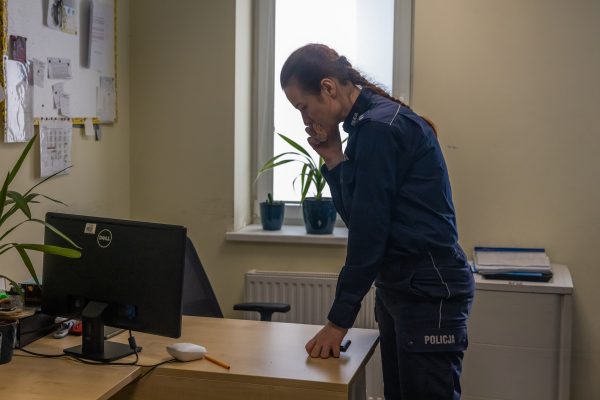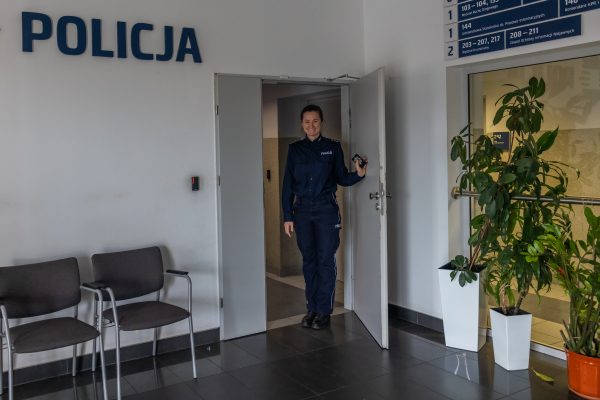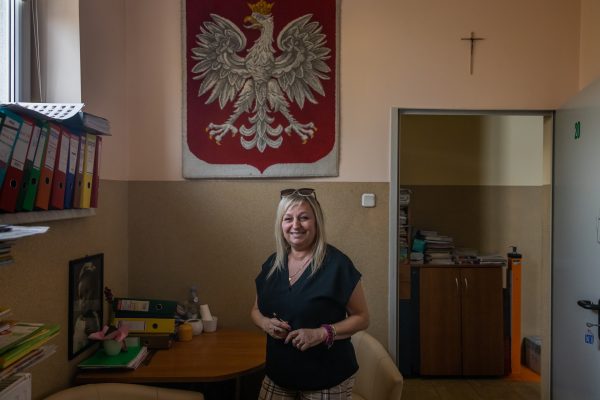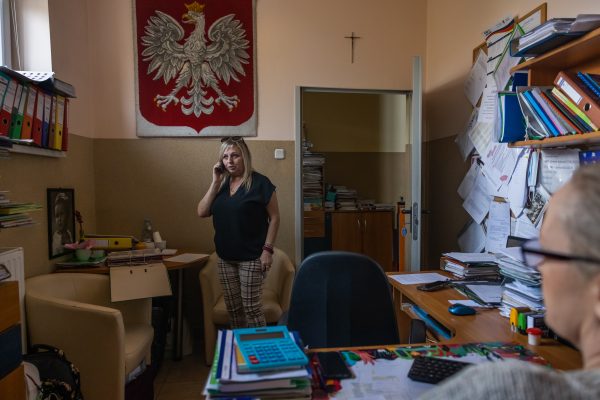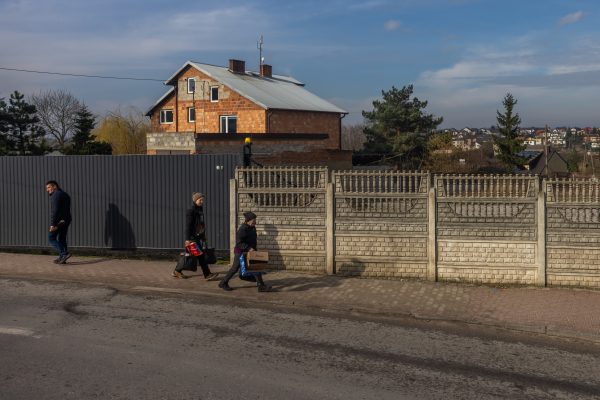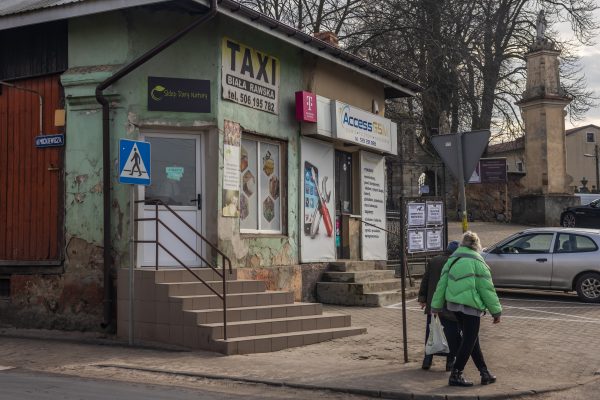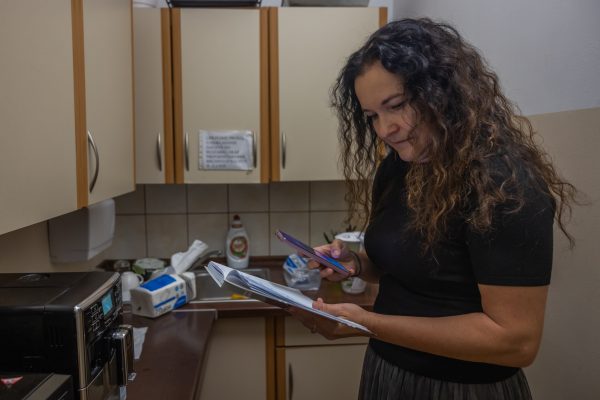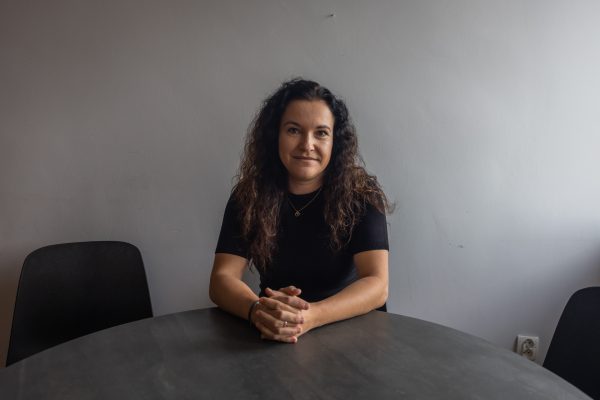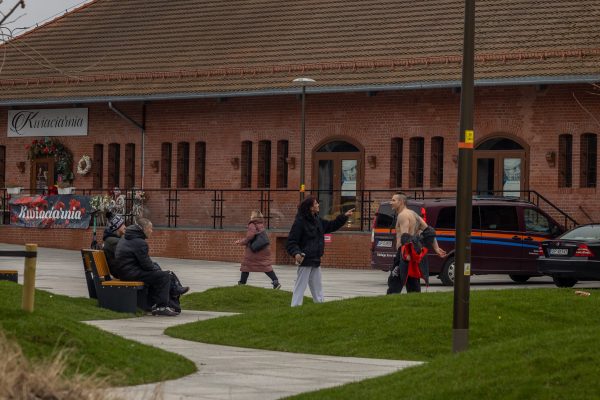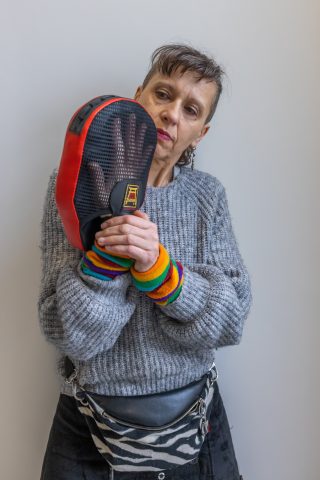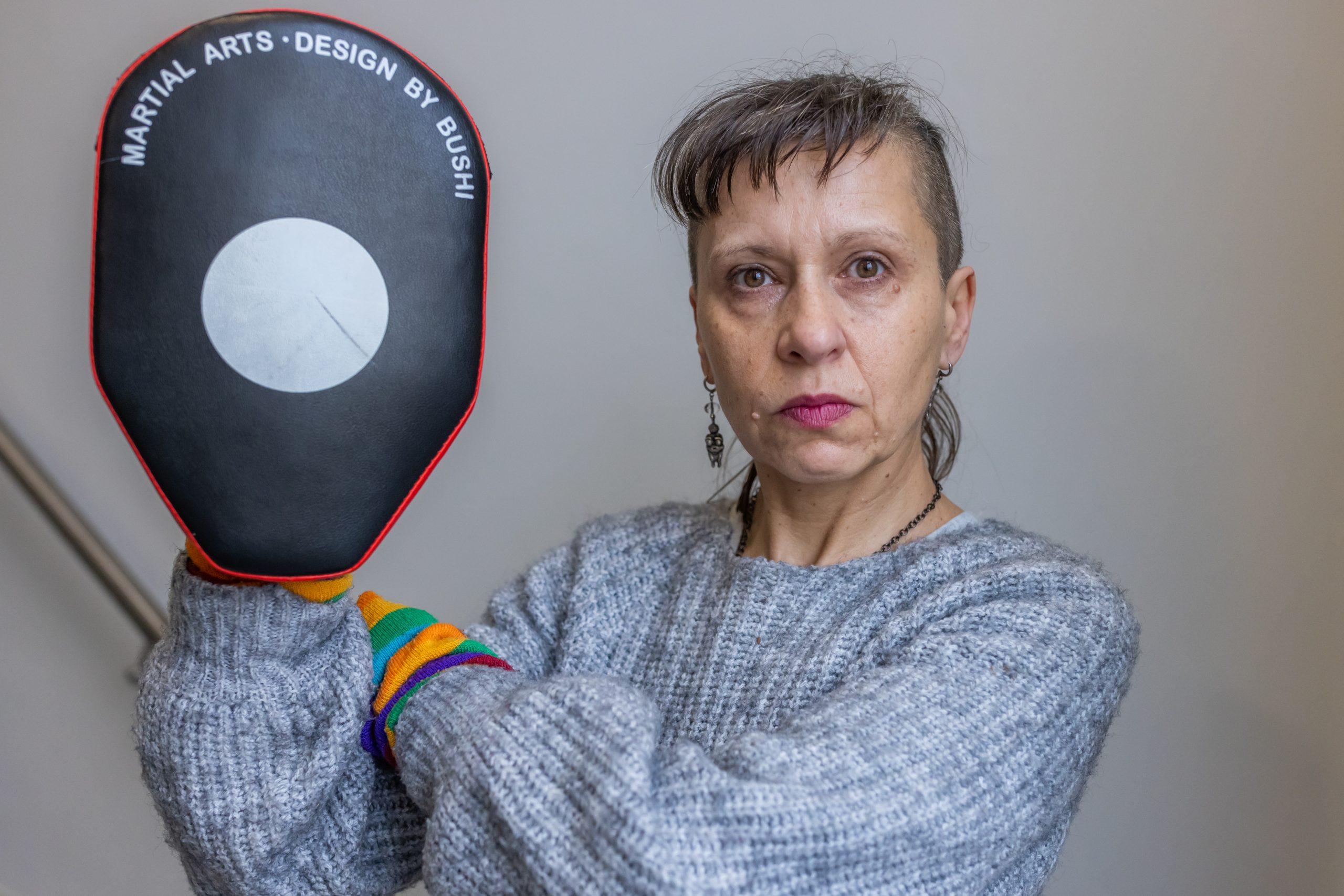
There is silence, for example, on the other end of the line, somewhere in between phrases like: “Is this the right number?”, “Can I take up some of your time?”, “I don’t really know why I’m calling…”.
Silence can also choke you, for example during therapy, when you have to think back to events that took place a year ago, too terrifying to put into words. Even if the words can be found, silence ensures that they do not find their way out.
Silence lurks in the eyes of the neighbours who turn away, can be heard in the silence of close relatives, and echoes in the words of a girlfriend who says “don’t be so dramatic!”.
Abuse of women flourishes due to silence. A study conducted in 2013 by professor Beata Gruszczyńska of the Department of Criminology and Criminal Policy at Warsaw University revealed that a woman suffers abuse in Poland every forty seconds – be it physical, sexual, mental, or financial. Fortunately, there are people who fight the silence. The following describes their weapon.
Silence in Koluszki
The first move was made by Mariola. She met up with a girlfriend for coffee in March 2018. The friend said that she attended meetings in Łódź organised by A Woman’s Path. Women travel writers tell us about their escapades, poets recite poems, and there are wax painting classes. It turned out that she was not the only one. A number of women from Koluszki attend these meetings regularly, and this upset Mariola: “My girls are not going to journey to Łódź!”. Mariola Garnys-Jaskóła has worked in education all her life, and now is the head teacher at a kindergarten. She has been connected with the municipality of Koluszki since childhood, and now lives in Będzelin. There is a saying in Koluszki, that “Będzelin would be the capital of Poland if it weren’t for Warsaw”. Why is that? “Because that’s where Mariola lives!”. She is constantly having bursts of energy, and so she had barely finished her coffee when she was hurrying to the government offices to get approval from the authorities, and then go to a local restaurant to ask whether she could hold women’s meetings there. The organisational committee convened and thought up the name Through Women’s Eyes. The first meeting was attended by 120 people. That was a huge success, because Koluszki has just over 13 000 inhabitants. A tenor friendly with the organisation gave a concert, and there was a fund-raiser for a boy who was ill. It was agreed that they would meet on the second Thursday of every month. There were many people keen to give talks on their hobbies – a talk given by a cosmetologist, decoupage classes, and a historian who gave fascinating accounts of the Łódź area.
The second move was made by Bogna, who attended one of the meetings held by Mariola. At once they found that they had lots in common. Bogna Stawicka had just moved to a village outside Koluszki. Before that, she had been living in Łódź, and had been the plenipotentiary for equality for the mayor, Hanna Zdanowska, and continues to be the head of the association kobiety.łódź.pl., but she felt that gradually she was nearing retirement, and wanted to lie in a hammock and read books. Meanwhile, there was always something happening in Łódź. She concluded that gradually the time was coming when she should stand aside to allow others to act.
Bogna quickly realised that there were a lot of widows in the village. Their husbands had not been able to stand the excessive amount of alcohol. Even if women remarry, the same problem arises. Without alcohol, there is no fun. Bogna organised a meeting at the local community centre to mark the opening of a new flowerbed, and everyone in the village was invited. Suddenly somebody called and asked: “will there be alcohol?”. It is also not possible to grieve without alcohol. Somebody lost their wife and the approach of their loved ones was: “If he has a little drink, maybe it will help him to forget?”. Bogna also noticed that domestic abuse was taking place. Everyone knew about it, but nobody was willing to say so out loud, instead they skirted the issue. One time, a neighbour mentioned a woman who had a black eye because she had “stepped on a rake”. In addition, she noticed that essentially there were no CSOs in nearby Koluszki. Not much was happening in general. There is a cinema and two coffee houses, but elderly women are not inclined to go there. This is not customary.
Each Through Women’s Eyes meeting was attended by 15-20 women. Sometimes, when they were sitting drinking coffee or tea, they would start talking about problems. One of them mentioned that her neighbour’s husband was a drinker, one said a child was performing poorly at school, or another would say that she couldn’t find a job. In fact, the meetings are attended by the most active women in the area. How many women are stuck alone at home with their problems and no one to turn to? This led to the idea of opening an aid, support, and development centre in Koluszki, and the ball was set rolling. Mariola was charismatic and had a talent for integrating people. Bogna knew how to obtain a grant for the project Time for Equality under the Active Citizens Fund – National Programme (run using EEA and Norwegian funds – ed.).
They went to the mayor of Koluszki to ask him to sponsor the project, but he was concerned that this was a feminist project, and let’s be frank – this word does not have the best connotation in Koluszki. So Mariola said that she was not a feminist in any way, and Bogna stressed that she was, but that Mariola was in charge. They made it clear that the project would focus on equality, and that men would not be excluded. Eventually, the mayor agreed.
As there was a pandemic, the first thing they did was open a helpline. It operated in the afternoons at specified times, and was attended by a woman psychologist, police officer, and local councillor. They chose people trusted in the community, so that callers would not be scared to open up to them. They announced the number in the local newspaper and on Facebook, and distributed flyers. A banner was always put up at Through Women’s Eyes meetings. Once the pandemic had eased a little, they asked the mayor whether some premises might be found, and they were given a small room in the elderly centre building. The room was large enough for two small tables, a few chairs, and a kettle to make tea. This was enough.
Cinema, a walk, and painting nails
On the other hand, women still prefer to call.
At first, there is silence, and then hesitant questions: “Is this definitely the right number?”, “Can I take up some of your time?”. Then the caller would get everything off her chest. This would usually be her husband’s alcoholism, whether this was pathological or cultural. Some husbands start arguments, and can be aggressive, and their wives are paralysed with fear, but there are also those who work and bring home money, but relax by drinking five beers every night. The wives of these men cannot communicate with them, and the relationship is in tatters.
The telephone is answered by Katarzyna Hejduk-Mela, a psychologist who works at local social welfare centres, and is very familiar with the situation.
She gives her diagnosis – it is hard for a woman in Koluszki to keep herself and her children on her own, even if she is working. – She can’t rent a flat, because there is a shortage on the market, and they are even more expensive than in Łódź. Often, these women do not see any chance of making changes in their lives. For them, this is a trap.
– and what advice do you give women who are in a trap? –I ask.
– I ask them to think about what they can do for themselves. They are usually focused on the man – has he had a drink today, has he brought his wages home? But I try to give them the strength to shift the focus to themselves. This is the main element of working with a person who is codependent.
Sometimes she asks the caller what she would like her life to be like, and she says “I don’t know”, because for twenty years she has constantly taken care of the home, children, and work. She is dealing with that alone, usually her husband is only a burden to her. She has money to go to the cinema, but she has a mental block – “Am I supposed to go on my own?”. “So maybe start by going for a walk?”. “People will look at me as if I’m an idiot”. How is a woman who is too shy to go for a walk by herself supposed to find the strength to get a divorce? She needs to start by taking the smallest step, for example painting her nails.
Once a woman has decided to call and break her silence, sometimes they report physical abuse, but usually the abuse is psychological – derogatory behaviour, humiliation, repeating toxic phrases: “You’re nobody without me!”, „You wouldn’t manage on your own!”. If a woman hears this one hundred times, she begins to believe it. One caller said that if she was beaten she could go to the police to have a forensic examination. Really? Everyone considers him a nice husband and father who plays with the children. Only she knows what he is really like. There are also cases of financial abuse, with controlled access to money and decisions regarding purchases. She wants to go on a training course, but he does not permit it. A woman’s place is in the home and she does not need to go on any training courses.
Kasia managed to convince one woman to go to the police, and another started coming to the centre to talk. In other cases, at the end of the conversation she heard the words: “At least I had a good cry with you”. Even if a woman does not have the strength to make any changes in her life at the moment, at least it is a relief to tell someone about her problems. Often, women do not have anyone to talk to, or their girlfriends say to them: “don’t be so dramatic, everyone drinks”, but Kasia knows how to listen and give advice as well. Self-sacrifice in a relationship is a subject with which she is intimately familiar. She completed a degree in psychology, but her career was put on hold. She resumed her career two years after divorcing her husband and attending therapy herself. She managed – she is raising three children, and has a job, a hobby, and friends. If a woman asks her to tell her story, she does.
Who called the centre? This is unclear. Primarily, the idea was that a caller would be asked at least to state her age and level of education, but this turned out to be impossible. If they were asked any personal questions, they simply hung up, and once again there was silence at the other end of the line.
Precise words
If any of them agreed to meet, it was with a woman police officer. Marta Marczak, precise and decisive, excellently versed in the law and procedures; she instantly instils trust.
– Do many women report domestic abuse to the police? – I ask.
– A lot of them do not – she says.
Why is that? The answer can be deduced from the questions that women who come to the centre ask the policewoman.
Firstly – they need someone to make them aware that what is happening in their homes or their relationship is abuse. They use vague phrases: “I am being harmed”, “Sometimes my husband insults me”. They need help to name, in specific terms, what is happening to them – isolation, ridicule, coercion into acting in a certain way, excessive control.
Secondly – they do not know what a criminal case is like and what they need to be prepared for. If someone does not know what to expect, it is not surprising that they are scared.
Thirdly, and perhaps the most important – women are scared to report abuse because they think that by doing so they will hurt their family. Their abuser keeps drumming this into them, while in fact there are various solutions available. For example, the abuser can be sent on compulsory therapy.
Domestic abuse cases are demanding. Until there is enough evidence, no charges will be brought, and for this reason the victim has to prove that they are being abused. Often, unfortunately, the police are unable to have the abuser convicted. Women are scared of court cases, and quickly become disillusioned.
– I explain to them that the ability to extract themselves from a dangerous situation, increasing their self-confidence, and learning to set boundaries is more important than the judgment – Marta Marczak says. – These are the means of winning their life. I know women who won criminal court cases, where the court found the husband to be an abuser, and in their life they continue to be under his control and are scared of setting boundaries. They can be paralysed with one glance.
Marta Marczak took a lot of calls, and went on one call-out. A few women decided to meet with her as well – at the centre, at a police station, or away from the police station if they were ashamed. No more and no less.
Schedule, trade fairs, and equality
The support centre was the heart of the project, but the Through Women’s Eyes association was also active on other fronts in the fight for equality. The members devised a schedule. Each month, a photograph of male and female employees in a different profession was obtained – there was the fire brigade, education, the police, and the city authority. They also made bags with equality slogans: “With a common understanding, winter turns to spring”. They travelled to Oslo for training organised by Terram Pacis, an organisation that works for human rights. At the training, they learnt how to analyse a community’s needs effectively and also visited the Oslo Intercultural Museum. They organised the Decent Guy Women’s Initiative Fair in Koluszki, at which women presented various ideas for businesses, but men were also welcome.
– I get the impression that more women began to understand what is meant by equality, and what rights they have – Mariola Garnys-Jaskóła says, – but it was men who changed the most. At first, we heard them say: “Feminists!”. Over time they realised that we only want to stress the importance of equality, and it is not our intention to destroy them. They started to support us. When we held an equality picnic and other events, they asked how they could help.
The aid, support, and development centre continues to operate – three Thursdays a month from four until six in the afternoon. Women living in Koluszki and the vicinity are gradually becoming aware that there is somewhere they can call in times of trouble. That they are completely alone with the harm done to them. The silence engulfing many households might soon start to gradually crack.
Silence in Opole
Małgorzata Kulczycka continued to be silent for ten or more years, and it was not until shortly before her thirtieth birthday that she came to the realisation that she had been sexually abused as a child. Until that time, she simply didn’t remember that; the memories were successfully erased, hidden in her subconscious. They came to the surface when various friends began to talk about abuse suffered by their daughters – troubling situations at school or inappropriate touching by a father or a mother’s partner, and then suddenly that image simply came back to her. This was the first crack in the silence.
The second appeared when Gocha became a coach in WenDo, which is a means of self-defence and self-assertion for women. She listened to many stories in the groups she led. She met a large number of women who had been sexually abused. Many of them simply didn’t know this, because it was not only a question of rape or clearly being molested. This also included being whistled at in the street, a slap on the rear, exposure, sexist jokes, and comments made by a boss who stares at cleavage. It also includes being forced into sex by a husband. A wife is often convinced that sex in marriage is an obligation of hers, and in some cases they do not know what they experienced because this form of daily abuse is hardly ever talked about. This makes them languish unawares, and in silence.
Gocha decided to break down that silence. Being an activist is her profession and her calling. Since 2016 she has been active in the Diversity Initiative Factory in Opole. Certain subjects simply call out to her, especially the ones that are swept under the carpet. This is how the idea for the Power When Abused project came about. This was intended to provide support for women who suffer sexual abuse. To make them feel strong, find the courage to speak out, and inspire other women to do the same.
A grant was obtained under the Active Citizens Fund – National Programme. In 2019, the girls in the association posted an invitation to join on their website and Facebook. They invited as well, in person, people they knew might be interested, supposing that fifteen women from Opole would take part in the project. The pandemic broke out, however, and so they decided to move the meetings online and form a nationwide group – girls for example from Warsaw or Bydgoszcz enrolled.
– We didn’t form judgements about whether a woman had suffered gang rape or minor acts of abuse – Gocha stresses. – Despite this, during the enrolment sessions, women often doubted whether they had definitely suffered enough harm to be eligible. This shows the extent of the taboo we were dealing with.
They started working on breaking the silence on three-day courses. What were they doing? At first they told their stories in a safe place, making sure that the space in the room had a soothing effect, and bought soft fur cushions. When the girls sat down in a circle and talked about their difficult experiences, they had something to hug. Karo Akabal, the founder of Sex&Love School, led classes on sexuality, and sexuality educator Kamila Raczyńska-Chomyn gave classes on trauma to the body. Little is said about the traces left on the body.
– We wanted to show how many things can help us restore our health – Gocha says. – It is clear that it is worth starting psychotherapy, but not many people realise that you can also make an appointment with an osteopath for an abdominal massage.
Silence can also be broken by yelling and hitting. The girls had WenDo classes and practiced simple ways of defending themselves when in danger. They all have a hand muscle that can break an attacker’s nose, and can also be used to break a wooden board.
In addition to learning how to use strength, they learnt how to exude strength. Sometimes violence can be avoided by changing posture, standing straight, walking with confidence, and using a decisive tone of voice. It is also worth practicing the cold Basilisk stare, to be able to make an attacker freeze in a second. It is worth yelling. Women rarely yell, because they are taught from childhood to be quiet and not take up space. They are taught that their bodies are not their own and that their fate can be decided by others. Therefore this mental barrier has to be overcome in order to defend oneself. In order to yell, and break a wooden board.
Everyone has some means of defending themselves; they only have to feel the strength within them. The classes were attended by a person with a mobility disability due to which they were not able to break the wooden board, but it turned out that they have a weapon in the form of their wheelchair. They are able to use the wheelchair to move a sofa with five people sitting on it
Story-telling
Self-advocacy is talking about one’s experiences, problems, and needs, in order to change the world. Would you like to try it? The next time someone tells a sexist joke in your presence, say: “I experienced sexual abuse and did not find that joke amusing”, and you probably won’t be told that you have no sense of humour. It is the person who made the joke who will feel embarrassed. They might wonder whether they themselves have committed abuse, and they will definitely think twice before they tell the joke again.
Abuse flourishes due to silence, and thus talking about it out loud truly prevents it. It makes abusers feel shame and emboldens people who have suffered abuse to pass on their stories.
– At one time, I played the role of a “living book” as a sexuality educator and person who had suffered sexual abuse – Gocha Kulczycka says. – I was supposed to be talking about my work and experience, and ended up listening to other people’s stories. For many of them, it was the first time that they had been bold enough to admit to someone that they had been abused. They were scared to tell their family, and embarrassed to open up to a therapist. They did not feel safe until they were with someone who had had similar experiences.
After the first meeting, which was held in person, support group meetings were held online. Some addressed a specific issue – there was a discussion on disassociation, i.e. how a person who has experienced trauma becomes detached from reality, and what form self-advocacy should take. How to talk about oneself without suffering burn out. Of course, people do not have the strength to be always on call and react in every instance of injustice. They have to take time to rest and regenerate. However there were also meetings at which the girls simply talked about their experiences and gave each other support.
The next time they met in person, they painted pictures. They drew their outline on card and then painted them and glued things on. Using art, they tried to take care of the injured parts of the body and get them back. One person decorated her body with feathers, and another wrote on her body all the insults and abusive language she had heard in her life. Another painted a lake near her hip. In December 2022, they held an exhibition of those works in Opole, and they were also willing to tell their stories.
Gosia Kulczycka and two girls travelled to Iceland. There the Slagtog organisation operates, dealing with self-defence issues. Slagtog helped to organise WenDo classes for Polish speakers and a meeting at which they talked about the Power When Abused project. Poles are the largest minority in Iceland, and can be found in every shop and petrol station. Many women travelled there, following their husbands. They do not speak English, and this makes it hard to forge relationships, or they live somewhere remote. Those are ideal conditions for abuse and silence to flourish.
Support groups in every town
Gaba languished in silence for a year. She was raped when she was nineteen. Her feelings of shame and guilt prevented her seeking help. She went to a doctor to get emergency contraception, but didn’t have a forensic examination or allow the police to be called. Undergoing a gynaecological examination and making statements to the police in that situation requires enormous strength, which Gaba did not have at that time.
She experienced abuse at the hands of a man she was drinking with. It is likely that he spiked her drink, because she lost consciousness. For this reason she was worried that as she didn’t remember what had happened, no one would believe her, or people would begin to judge her for causing that to happen. She was traumatised, and was not really sure herself if that was rape, because after all she did not defend herself while it was happening. She remembers googling the definition. She came across fora on which people described experiences of sexual abuse. When she read them, she had no doubt; the doubt did not arise until she thought about her own experience.
– Even though I was young, even at that time I identified as a feminist – Gaba recalls. – I had background knowledge, but even so, when that rape occurred I experienced it in terms of shame, doubt, and silence.
Almost immediately, she told a girlfriend and her boyfriend at the time everything, and they gave her support. Later on, however, when she tried at least to think about that occurrence, her brain simply shut down. It was not until approximately a year later there began to be signs of PTSD, and in fact she was unable to function normally. She had to stop studying and deal with her mental state.
Little is said about this, but sexual abuse is not a single unpleasant event from which you can move on. It has a long-term effect on health, education, work, and relationships, and how your whole life proceeds. Gaba was able to arrange group therapy for three months, using the national health system. At the beginning, however, when she tried to describe what had happened to her, she started to choke. The silence was not willing to give up without a fight.
She was told to continue therapy in one-to-one sessions, but found that there was a three-year wait. People who cannot afford to pay two hundred zlotys per session are left to themselves. The therapy helped Gaba to open up enough to begin talking about her experience with friends. She talked about it openly, especially when something triggered a return of the trauma. She listened to other women’s stories and learned from statistics and literature how common this experience is. She also worked, in various ways, with her body and regulating her nervous system.
Her involvement in the Power When Abused project was the next in many stages on the road to recovery.
– It enabled me to look at the history of sexual abuse in my life – she says. – Because that was not the only instance. I was also sexually abused before that, as a child and as a teenager.
During the classes, Gaba predefined her position as victim, because that is how people who have been abused are described – either you are a poor victim or a valiant survivor who is great at dealing with anything. Meanwhile, abuse is a complicated experience, with mixed feelings and attitudes. For this reason, talking to people in the group who understood what she was going through was of most value to her.
Today, Gaba does not accept silence as it is harmful to women and helps abusers. In the course of the project, she became a WenDo coach herself. In her view, this method of preventing violence has huge potential, and she wants to popularise it. She is also a masseuse and explores the possibility of recovery using the body. Little is said about the fact that people who have been abused need for example urogynecological physiotherapy. Many suffer from urinary and sexual dysfunction.
– It is my dream for more groups to be formed to provide women with a safe way to share their difficult experiences and deal with them – Gaba responds. – They can be provided with legal aid, and to some extent psychological aid, but group support is also needed. Abuse is a very difficult subject.
Gosia Kulczycka has a similar dream, but more specific. She would like a minimum of one support group to be created in every Polish town. It does not take much to create it – a cosy place, hot tea, and a person with training to make sure that the participants do not delve too deeply into troublesome experiences and exacerbate the trauma.
– I have no doubt that this is a solution suited to our time – Gocha says. – A support group means there is no need to rely on a system in which it is difficult to find a competent psychologist, especially in the national health system. Even being among people with whom we can share experiences really helps. No one will make any comments on how we look, our behaviour, or condition. No one will say: “You asked for it”, or “don’t be so dramatic!”. Everyone understands what we are dealing with.
This leads Gosia to hope that the project participants will continue to develop their experience and knowledge, and maybe even form their own support groups? She does not want to burden the participants with obligations, because she knows that working with personal experiences is highly strenuous. Everyone has to assess for themselves what they can do at any given time. On the other hand, she is sure that gradually a women’s support network will be created in Poland. Women’s stories will reverberate loudly. The silence that grabs the throat and causes choking will never come back again.
The projects Koluszki with Women and for Women, Time for Equality run by the Through Women’s Eyes Association, and Power when Abused run by the Diversity Initiative Factory – MIR, were carried out using grants under the Active Citizens Fund – National Programme funded by Iceland, Liechtenstein and Norway using EEA funds.
Text: Urszula Jabłońska
Photos: Anna Liminowicz
The report was published on Onet.pl
